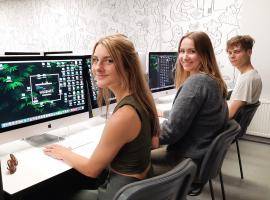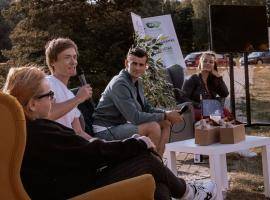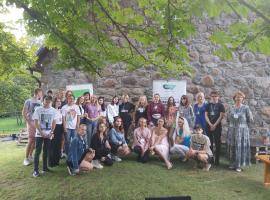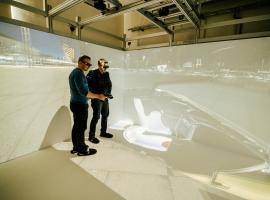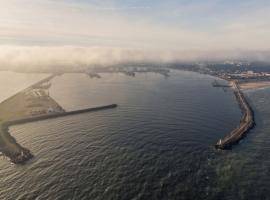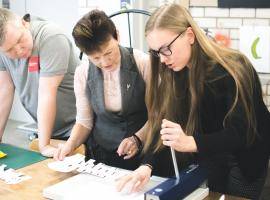NextGen Microcities ends, but it is just the beginning

NextGen Microcities[1] has formally ended as a UIA-funded experimentation. For one more year, partners committed to keep disseminating the results of the initiative, for the next few months the team will be busy reporting and accounting about the investment.
After three years of hard work, after the summer the team started to wrap up final activities, and organized the grand finale event in Ventspils on 13th October. I have attended the event together with a representative of the UIA Secretariat, and the occasion turned out to be even more interesting, as the NextGen team managed to organize for us a 48-hour visit to all the different strands of activities in both cities, Valmiera and Ventspils.
All partners of course contributed to the organization of both the project visit and the final event, and they have all demonstrated to be very proud of all the things that they achieved through this project. Surely lots have been done on all fronts: talent attraction, FDI attraction, Ed-tech and STEM education, business support services and innovative prototyping facilities. The list is long, and you can look at my past journal[2] of the project to get a glimpse into the complexity of it. In my next journal, due to be published by the end of the year, I will make an overview of all the accomplishments of NextGen Microcities.
In this article, I’d like to focus on the final event, because it was not just a public event of an EU funded project, it was more like a concert with an orchestra playing a music learned together. The whole team from all partners went on stage, showing the diversity of competences they all represented, and sharing the large amount of knowledge they have conquered through the project implementation. The agenda was impressive: six hours of programme, a lineup of 32 speakers divided into 12 panels. The location was impressive: the Ventspils Regional Music School and Concert Hall[3], a stunning building which is the centerpiece of the long-term program of urban rejuvenation in the Baltic port of Ventspils.
The event opened with institutional speakers. Both municipalities were represented by their respective chairmen of the city councils, together they stressed the message of how important it is to be able to land such investment projects that can help advance their local economies and get them readier for the opportunities coming from the digital transformation.
The Director of the UIA Secretariat Tim Caulfield provided an overview of the range of experimentations that were funded by the programme in its first programming period, and the perspectives on the second programming period.
Laura Codere, Project Manager of the NextGen Microcities project, gave an overview of the project’s streams of activities and the results achieved. Although it is very challenging to represent the complexity of the project and its several dimensions, she managed to give a clear overview of what was accomplished.
The conference has then continued with a series of panels exploring the different streams of activities of the project.
The first stream related to education, with two panels respectively on “innovative education technologies” and “challenges and opportunities of innovative education”. All project partners involved in this stream were represented on stage in those two panels. The interventions highlighted a few key concepts that can be useful to other cities in Europe wanting to test innovations in the formal education’s ecosystem:
- Digital transformation is affecting the way we live and the way we work; the labour market of the future will be far off better for those who will be able to understand and manage digital technologies, pretty much in all sectors of the economy;
- Preparing people for the future of the labour market requires a big shift towards the adoption of digital technologies for education and training, and the integration of the so called STEM disciplines (Science – Technology – Engineering – Math) into formal education trajectories;
- The pandemic crises have accelerated this transition process, penalizing those who were not ready to access and use distant learning technologies for both training and learning; the increasing pace of development requires shift action at all level of governance;
- Cities are placed in a very good space for experimentation, as they can test new policies that can reverse the trend and include more people in the game.
I will delve into digital transformation and innovation in education in my next Zoom-in for the project.
Talent attraction and growth was the topic for the following two panels, exploring another stream of activity of the NextGen Microcities project. Talent attraction is key to increase rapidly the talent or expertise pool of a local economy. Especially for those countries that are experimenting a net transfer of professionals to more competitive countries, addressing this issue is crucial, as the declining of skilled human capital can become an impediment for the digital and green transformation and therefore for economic growth. The risk to lag behind countries that have been able, or with more speed, to adapt to a changing global marketplace is real and present. This is even more true today, as the formal education cycles struggle to keep up with the rapidly changing landscape of the job market and the global economic cycles. But there is much that cities can do to deal with this issue, and the NextGen project adopted and tested some of the approaches that can work. In particular, a targeted scouting campaign, coupled with an interesting soft landing and integration process put in place, managed to achieve notable results already in the testing phase. Now, the municipalities intend to provide continuity to this action after the project’s end.
Connected to this issue, two more panels followed on the topic of Foreign Direct Investments. In addition to human capital, attracting money or existing companies from abroad that come and invest in the city is one of the best ways to accelerate economic development. In addition to that, hosting international companies helps to connect to global networks, increasing in turn visibility, and sparking interest as a potential city to invest in.
Generational marketing activities to incentivize young people to study STEM and their application was the topic of the two panels that followed. Certainly, the project showed that a targeted communication campaign, together with a country-wide policy to get citizens and especially young people closer to science and technology, helps to increase numbers of students in these areas. Students that will represent the workforce of the future. As part of a larger strategy, four science centers are being built in the country, one of which in Ventspils. Those science centers’ display different thematic areas (health, space, digital, etc.). They are hosted in new buildings designed with an international standard, and will offer a variety of edutainment installations that will inform and educate the citizens on the future of society and the economy. The NextGen project is contributing one of the galleries of the science center in Ventspils.
In my intervention, I highlighted the experimental nature of the NextGen Microcities project. Actually, one should speak in plural, as the project worked simultaneously on several streams of activities, all part of a larger strategy. I also stressed the importance of these experimentations for micro cities, as they are in large numbers in Europe and deserve a key role in the economic and social development of our countries. Moreover, the dual transition to green and digital offers these cities many opportunities, as people increasingly search for greener, more meaningful, livable cities all across the continent. Looking at the bigger picture, the transition to a more sustainable and inclusive society passes through the development of our cities.
This is the function of the UIA Initiative: to fund what no one else would, to try and experiment with really innovative urban policies, but most importantly offering the chance to test and demonstrate that they work, therefore becoming an inspiration for other cities.
What is needed though is the will to innovate, to try out novel solutions that present implementation challenges that no one else has faced before. This is certainly the case for Ventspils and Valmiera, that were able not just to innovate, but to charge ahead during difficult times and uncharted territories. They both showed leadership and commitment from their political representatives, they both displayed a small but growing ecosystem for innovation, driven by forward looking institutions and organizations, managed with high standards and an international outlook. Both cities implemented a layered, complex and integrated policy, which leverages on several touchpoints of the economy to foster development and inclusion at the same time. If I had to sum up what made the difference in this project’s implementation, I would say that it comes down to three things:
1. Having a strategy and pursuing it;
2. Being able to implement it collaboratively and efficiently;
3. Reaching out to the outside world, as no country, let alone city, can prosper on its own.
With those lessons, we bring back home the feeling that one project comes to an end, but its legacy will continue in many ways.








